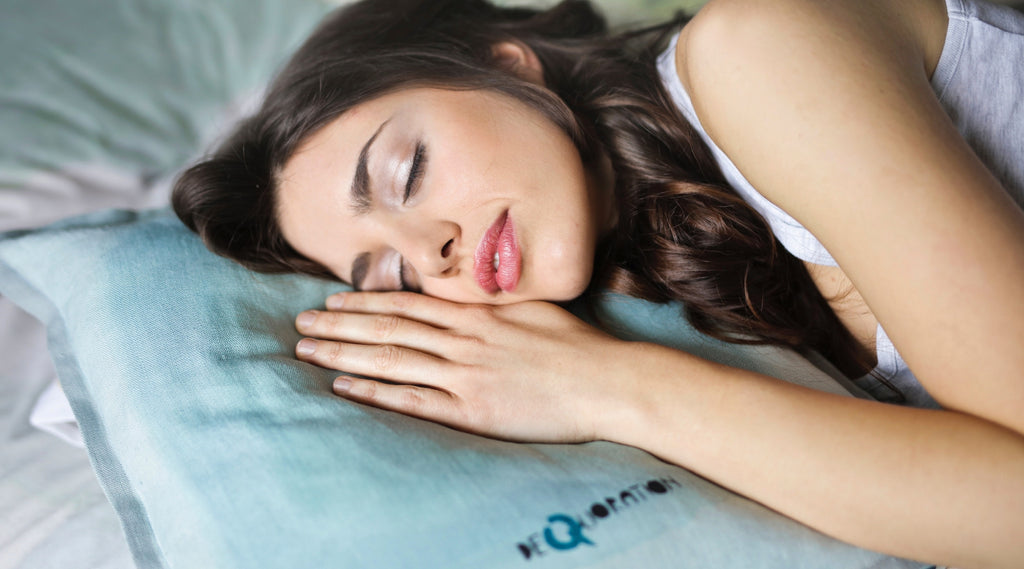How to Make Yourself Go to Sleep

Your quality of sleep every night has a major impact on your well-being and can affect the way you think, feel, and act. Lack of sleep can take a toll on you both physically and mentally, negatively impacting things such as daytime energy, productivity, weight, & emotional balance.
If you are unable to sleep on a regular basis, you may fall into a habit of relying on unhealthy sleep aids to get a good night's sleep. While these may be a quick fix in the short term, these substances make your sleep problems worse in the long run.
If you have trouble sleeping at night, there is help! Here are 5 simple and natural ways to make yourself catch some z’s:
- Get on a Sleep Schedule

Your body is set with a 24-hour internal “clock” that runs in the background of your brain and cycles between alertness & sleepiness at regular intervals. This sleep/wake cycle, known as the circadian rhythm, cues the body to feel alert during the daytime and sleepy when night falls.
Wake up and wind down at the same times each day to help your internal clock keep a more regular schedule. Once your body adjusts, it’s only easier to fall asleep and wake up around the same time each day! Make sure to map out a generous seven to nine hours of sleep every night as well - Studies (1) show that this is the optimal sleep duration for adults.
- Practice Yoga & Meditation

When you’re stressed, you tend to have a difficult time falling into dreamland. Yoga and meditation are powerful tools to relax the body and calm the mind in the promotion of a better night’s rest.
Yoga will help boost the production of serotonin in the brain and decrease levels of cortisol, the stress hormone. This can increase both the duration and quality of your sleep! Meditation, on the other hand, can enhance your melatonin levels and assist the brain in achieving a state where sleep is easily attained. Grab a yoga mat and find a place where you can comfortably ignore the outside world.
- Listen to Relaxing Music

Music can significantly improve your quality of sleep. It has a direct effect on the parasympathetic nervous system, which helps the body relax and prepare for rest. Listening to a relaxing tune may slow your heart rate and breathing and may even trigger your muscles to relax. Say, “Hey Alexa, play some peaceful music!”
- Lower the Room Temperature

If your bedroom is too warm, you may have a difficult time resting no matter how comfy your bed is! This is because of our body’s internal thermostat. Whenever you’re lying down trying to snooze, your body temperature naturally decreases for sleep initiation. Dial your room thermostat to a cooler temperature between 60–75°F and a slight drop in your core temp will make you fall asleep faster.
- Use the Latest EMDR Equipment

If all else fails, turn to neuroscience! Recent neurotechnological advances offer a new way to beat the sleep struggle. TouchPoints EMDR buzzers can be a natural, non-habit-forming way to help you fall asleep, for example. Use the devices for only a few minutes before bedtime and you may increase both the quality and amount of sleep due to the BLAST (bi-lateral alternating stimulation tactile) reducing beta activity in the brain, which may help reduce the stress symptoms that keep you up.
Resources:
- https://www.ncbi.nlm.nih.gov/pubmed/26075423
- https://www.healthline.com/nutrition/ways-to-fall-asleep#section5
- https://www.sleepfoundation.org/articles/what-circadian-rhythm
- https://www.sleepfoundation.org/articles/can-music-help-you-calm-down-and-sleep-better
- https://www.sleepadvisor.org/best-temperature-for-sleep/





